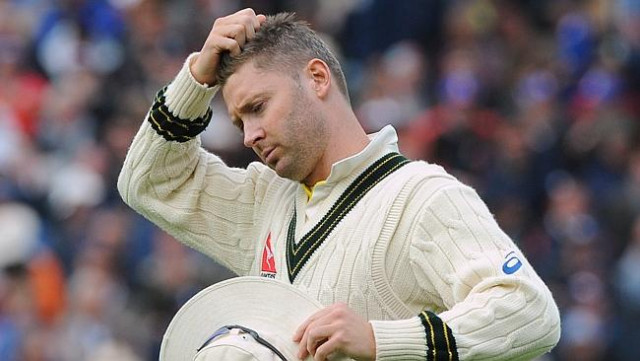Clarke demands more of bowlers -- and himself
Australia's captain was hard on himself after an eight-wicket defeat by England in the third Ashes Test

"We had perfect bowling conditions. Overcast, a little bit of rain around and we just couldn't hit the areas consistently," said Michael Clarke. PHOTO COURTESY: DBVNEWS
A remarkable match ended inside three days as England pacemen James Anderson and Steven Finn took six wickets each in below par Australia scores of 136 and 265 respectively on a seaming but far from unplayable pitch in Birmingham.
Read: Rogers laments Australia's lack of fight
As a result, Australia's bowlers didn't have anything like sufficient runs to play with, particularly when England were chasing a modest target of 121 for victory.
That England needed a three-figure score to win was in large part down to the fact that Australia's last three wickets added 97 runs between them on Friday.
This was a rebuke to Australia's specialist batsmen, with opener David Warner (77) the only member of the top six to make a double-figure score in the innings.
Nevertheless, it was true that Australia's attack lacked England's accuracy, after their extra speed proved a trump card in the second Test at Lord's where the tourists won by 405 runs on a placid pitch to square the series at 1-1.
"We had perfect bowling conditions. Overcast, a little bit of rain around and we just couldn't hit the areas consistently," Clarke said.
"The ball swung and seamed for the whole game. We had to be better than what we were," he added ahead of next week's fourth Test across the Midlands at Trent Bridge.
Mitchell Johnson, in the course of becoming just the fifth Australian to take 300 Test wickets, started Thursday's second day in sensational fashion with a couple of sharply rising deliveries that had both Jonny Bairstow and Ben Stokes caught behind off the glove.
Read: Mitchell Johnson joins Australia's 300 club
And fellow left-arm quick Mitchell Starc gave Australia a glimmer of hope on Friday when he bowled England captain and opening batsman Alastair Cook with a full and swinging ball for seven.
These though were rare highlights, and while Australia's occasional waywardness at Lord's was masked by the fact that they had already put a commanding 566 first-innings runs on the scoreboard it was a different story at Edgbaston.
Australia's difficulties against the swinging and seaming ball have led to accusations their batsmen are "flat-track bullies".
And while it would be harsh in the extreme to blame Australia's bowlers for their defeat at Edgbaston -- all attacks like having plenty of runs on the board -- Clarke challenged them to maintain the standard they had set at Lord's.
"I don't think we executed as well as we did at Lord's, certainly in the first innings," he said.
"It is a tough one because you see both sides, you see the way we bowled here and Cardiff (where England won the first Test by 169 runs) wasn't good enough.
"You see the way we bowled at Lord's and that was as good as any attack you will see in world cricket."
Meanwhile the 34-year-old Clarke, one of the leading batsmen of his generation, didn't spare himself from critical analysis after scores of 10 and three at Edgbaston left him with a meagre series aggregate of 94 runs in six innings at an average of under 19.
"I think it's always going to be hard to beat any opposition when they've got 11 and we've only 10," Clarke said.
"It is time for the captain to get off the plane and turn up.
"With my performances so far, I certainly haven't led from the front as I'd like to do as captain."
As for the persistent barracking of Johnson by a raucous Edgbaston crowd, Clarke said: "I think it's fantastic ... a big part of homeground advantage, you've got the crowd behind you.
"That's one of the best things about playing sport at the highest level."



















COMMENTS
Comments are moderated and generally will be posted if they are on-topic and not abusive.
For more information, please see our Comments FAQ